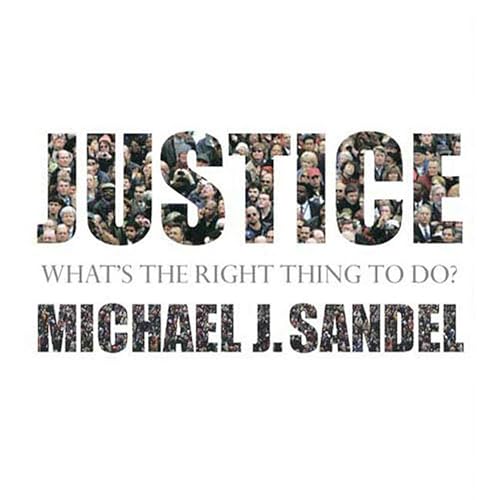
Justice
What's the Right Thing to Do?
No se pudo agregar al carrito
Add to Cart failed.
Error al Agregar a Lista de Deseos.
Error al eliminar de la lista de deseos.
Error al añadir a tu biblioteca
Error al seguir el podcast
Error al dejar de seguir el podcast
 Exclusivo para miembros Prime: ¿Nuevo en Audible? Obtén 2 audiolibros gratis con tu prueba.
Exclusivo para miembros Prime: ¿Nuevo en Audible? Obtén 2 audiolibros gratis con tu prueba.Compra ahora por $24.74
-
Narrado por:
-
Michael J. Sandel
A renowned Harvard professor's brilliant, sweeping, inspiring account of the role of justice in our society--and of the moral dilemmas we face as citizens
What are our obligations to others as people in a free society? Should government tax the rich to help the poor? Is the free market fair? Is it sometimes wrong to tell the truth? Is killing sometimes morally required? Is it possible, or desirable, to legislate morality? Do individual rights and the common good conflict?
These questions are at the core of our public life today—and at the heart of Justice, in which Michael J. Sandel shows how a surer grasp of philosophy can help us to make sense of politics, morality, and our own convictions as well.
Sandel's legendary Justice course is one of the most popular and influential at Harvard. Up to a thousand students pack the campus theater to hear Sandel relate the big questions of political philosophy to the most vexing issues of the day. In the fall of 2009, PBS will air a series based on the course.
Justice offers listeners the same exhilarating journey that captivates Harvard students—the challenge of thinking our way through the hard moral challenges we confront as citizens. It is a searching, lyrical exploration of the meaning of justice, an audiobook that invites readers of all political persuasions to consider familiar controversies in fresh and illuminating ways. Affirmative action, same-sex marriage, physician-assisted suicide, abortion, national service, the moral limits of markets, patriotism and dissent—Sandel shows how even the most hotly contested issues can be illuminated by reasoned moral argument.
Justice is lively, thought-provoking, and wise—an essential new addition to the small shelf of books that speak convincingly to the big questions of our civic life.
Los oyentes también disfrutaron:




















Reseñas de la Crítica
Las personas que vieron esto también vieron:







![Justicia [Justice] Audiolibro Por Michael J. Sandel, Juan Pedro Campos - translator arte de portada](https://m.media-amazon.com/images/I/41l+UrVrFtL._SL240_.jpg)










Dated, yet still relevant in 2023.
Se ha producido un error. Vuelve a intentarlo dentro de unos minutos.
It’ll make you less dumb
Se ha producido un error. Vuelve a intentarlo dentro de unos minutos.
Excellent!
Se ha producido un error. Vuelve a intentarlo dentro de unos minutos.
Everyone should read this book.
Se ha producido un error. Vuelve a intentarlo dentro de unos minutos.
Any additional comments?
This is the book that pushes me to think out of my comfort zone. The justice problem is far more outreaching than we could be aware of.A book that makes us think
Se ha producido un error. Vuelve a intentarlo dentro de unos minutos.


